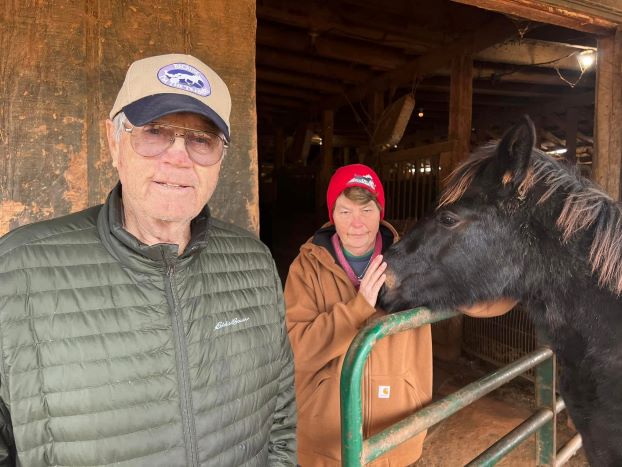In retirement, Charlotte County vet focuses on horse training
Published 12:47 am Sunday, March 30, 2025
|
Getting your Trinity Audio player ready...
|
For 52 years, Dr. Charles Dunavant treated four-legged patients in Charlotte and Lunenburg counties. If a horse in Charlotte Court House needed treatment, his owners knew where to go. The Charlotte vet has since given up his practice, this being the first year Charles didn’t renew his veterinary license. But he stays busy, training horses and getting them ready for race day.
Charles wakes up at 7:30 a.m. each day and heads out of his house toward the ½ mile track on Woodhill Farm. By now, his horses have been fed, harnessed, and they’re ready for training. At 81, Charles still works with each.
By noon, he, his wife Jane, and their one employee are done for the day. The horses cool down, bathe, and take the afternoon off. Training these horses is like training athletes, Charles says. They’re expected to drop five seconds off their mile time every two to three weeks, reaching 2:05 per mile to qualify for races.
Trending
“I’ve been fortunate enough to have some decent horses race every year since 1973,” Charles said. And he’s not kidding. In fact, you have to credit Charles Dunavant as being instrumental in the early years of harness racing at Colonial Downs. His harness racing career has spanned almost 53 years, beginning officially in the early 70s and continuing today. His love of horses stretches even beyond that, as it and horse racing have been a lifelong passion.
“It started when I was a kid,” Charles recalls. The Richmond native got his first horse at age two. By the time high school rolled around, he and his friends would harness their ponies and race for a $50 to $100 purse.
After graduating from veterinary school at the University of Georgia, Charlie returned to Virginia, purchased Woodhill Farm in Victoria, and bought his first standardbred horse. He began breeding and selling horses while his veterinary practice in Kenbridge got up and running.
Getting started with dairy work
Dr. Dunavant’s early veterinary practice consisted mostly of dairy work.
“There weren’t a lot of horses in the area in the 1970s,” Charles said, “but that didn’t stop me from developing a reputation for them.” Through the early 70s, the Charlotte vet grew his practice while increasing his presence in the harness racing community.
Within three years, Charles was racing. Within five, he was the president of the Virginia Harness Horse Association. Without a track in Virginia for his standardbreds, Charles primarily raced in Maryland, New Jersey, and Pennsylvania.
From 1970 to 1988, the biggest hurdle in growing harness racing was legalizing pari-mutuel betting. This type of gambling allows bettors to put money down any horse of their choosing. Payouts are made from the pool of bets after the operator’s commission and taxes are taken out. Pari-mutuel betting ensures the house and bettor win, paving a profitable future for harness racing in Virginia.
It took several years of failed ballot measures, lobbying, and negotiations to get the state on board with horse and harness racing.
“Sometimes it was a bit like pulling teeth, but we got it done,” Charles said. With pari-mutuel betting approved in the late ’80s, Dr. Dunavant and the VHHA got to work on integrating harness racing into Colonial Downs.
Dr. Dunavant’s work didn’t stop there. He negotiated with Colonial Downs to secure race days throughout the year, manage the marketing budget, and even move the meet times to 4 p.m. so the track could save money on lights.
Charlotte vet brings in family to help
Both harness racing and his equine practice became a family affair. His daughter now practices alongside his old partner, and his wife, Jane, is involved in racing every step of the way.
“She’s quite the horseman,” Charles said. Not only does Jane ride three days a week, but she received her harness training license when Colonial Downs opened to take over operations while Dr. Dunavant was treating patients.
The couple’s business savvy goes both ways. Once, at a sale in Harrisburg, Jane shot her hand up to buy a mare named Chesnut. The mare’s first two offspring never made it to race. She had two more colts, but with doubt already sowed, Dr. Dunavant sold her as a buggy horse to a man up north. Soon, the two colts started winning races and made over $300,000. Charles called and asked if he could repurchase Chesnut, but like Jane, the man’s wife loved her too much.
“I let her slip through my fingers, sweet as she could be,” said Dr. Dunavant.
And while things have changed a bit for the Charlotte vet, he’s not going quietly into retirement. Despite 2025 being the first year Dr. Dunavant did not renew his veterinary license, he’s still keeping busy treating his 40 horses at Woodhill Farm.
Charles is also still involved in the racing part of it all. He’ll have horses running this spring at Shenandoah Downs, with events kicking off in April.
Editor’s Note: Reporter Essie Somma wrote this story for the Charlotte Gazette.




